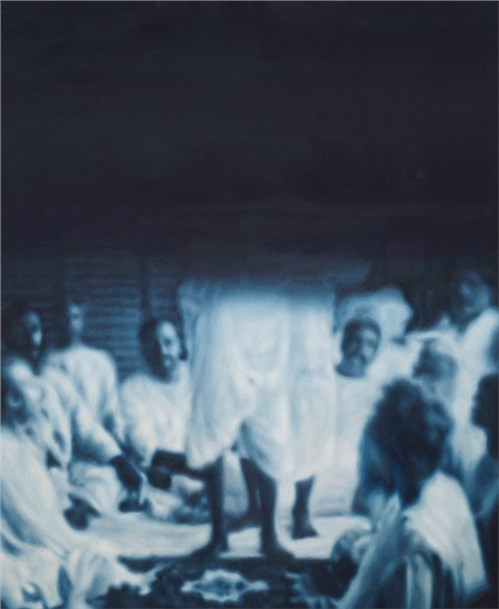Rome,
980 Madison Avenue New York
18 January 2020 - 21 March 2020
Abstraction has always been a part of my work.
—Y.Z. Kami
—Y.Z. Kami
Gagosian is pleased to present Night Paintings, an exhibition of new works by Y.Z. Kami. This is his first solo exhibition in Italy, following his participation in The Spark Is You, a group exhibition organized by the Parasol unit foundation for contemporary art, London, in conjunction with the 58th Biennale di Venezia this year.
Kami’s tenebrous Night Paintings (2017–) are composed largely from a single shade of indigo—said to be the color of the night—mixed with various gradations of white. Each canvas in this new series is filled with blue-whitish apparitions that float just past the limits of materiality and concrete representation. These outlines shift between seemingly solid, liquid, and gaseous states—an osseous structure melts into a milky swirl, which in turn evaporates into a coil of smoke—yet their true forms and references ultimately remain veiled beneath hazy brushwork.
With their soft edges and shimmering biomorphic patterns, Kami’s paintings limn the boundaries between the earthly and the sublime. Subtly informed by his cultural heritage yet resolutely cosmopolitan and secular, Kami’s oeuvre communicates a philosophical and spiritual reflectiveness; at the same time, he visually obscures and anonymizes his subjects, preferring to approach broader questions of the infinite and the ineffable rather than delving into the specifics of a religious existence.
Kami is known for his portraits of family, friends, and anonymous strangers, all painted from snapshots that he takes himself. With their blurred features and muted palettes, these psychologically arresting works recall the sobriety and frankness of ancient Egyptian Fayum paintings—funerary portraits of the deceased in the prime of life that were affixed to mummies before burial. In recent years, he has also broadened his subject matter, using his signature sfumato application of paint to treat an array of contemplative subjects including church interiors, death masks, and hands supplicated in prayer.
The Great Swan (2018) ventures into figuration, although the Hindu mystics depicted in this enigmatic composition are so blurred that their robes and faces verge on total dissolution. Here, as with the tantalizing indistinctness of his other Night Paintings, Kami engages in a push and pull between abstraction and figuration, further confounding the viewer’s attempts to recognize elements from the human realm. The entire top register of The Great Swan is veiled by a pall of solid indigo that obscures the face of the central standing figure, whose presence seems to have brought his seated audience to rapt attention. The painting is cloaked in descending darkness, half-covered by an inscrutable eclipse or the heavy lid of a somnolent eye.
Kami’s new monograph Y.Z. Kami: Works 1985–2018 was recently copublished by Skira and Gagosian and is also available at the Gagosian Shop. This comprehensive volume reproduces more than three hundred works and includes essays by art critic Laura Cumming, independent curator Elena Geuna, and curator and writer Robert Storr.
